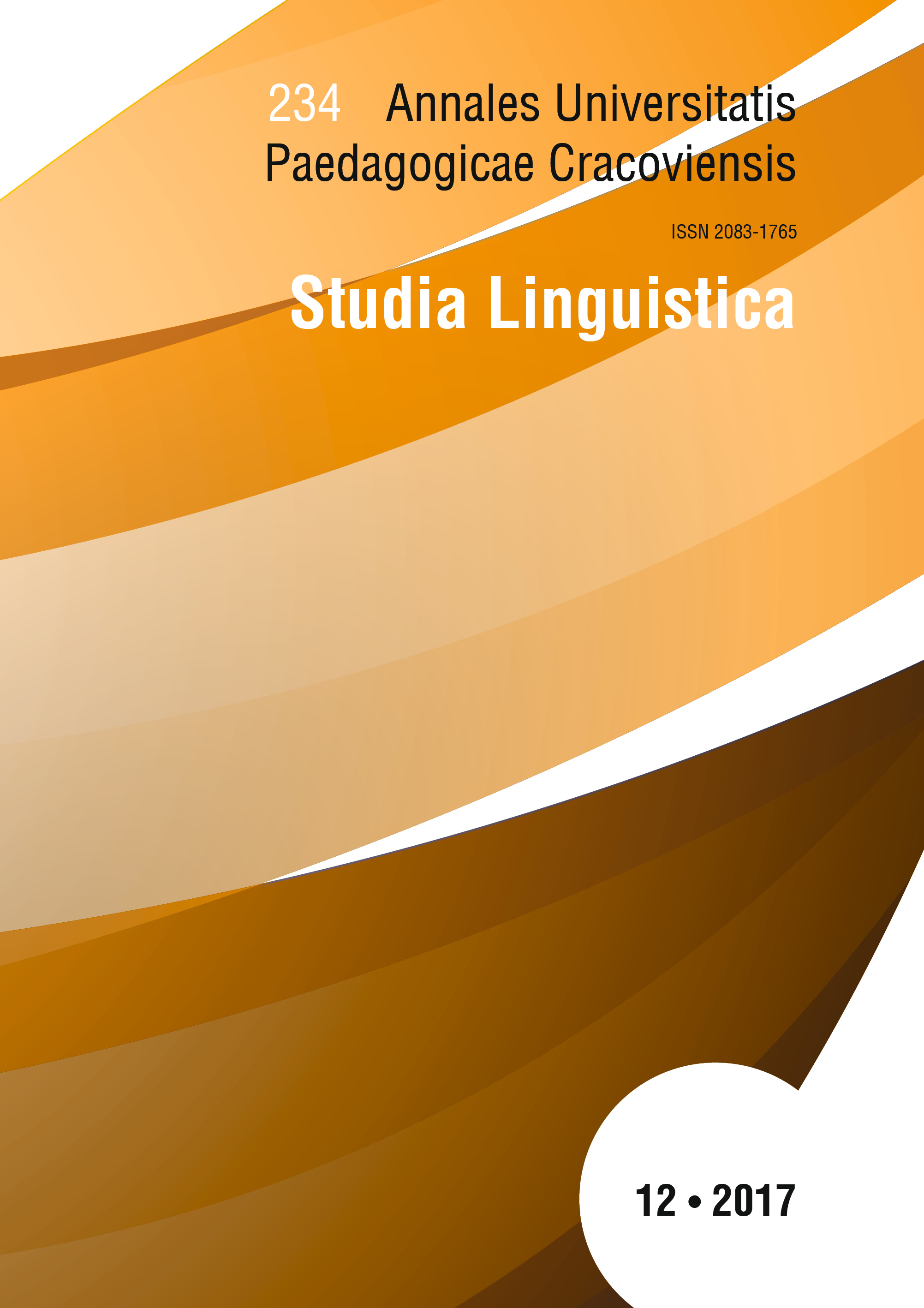Ogólna koncepcja metainformacji w Wielkim słowniku języka polskiego PAN
Main Article Content
Abstrakt
The term metainformation corresponds to the term outside matter introduced by Hartmann and James (1998) and refers to the all the information in a dictionary outside dictionary entries. The paper deals with the project of such metainformation in an electronic dictionary, namely in Wielki słownik języka polskiego PAN (PAS Great Dictionary of Polish) which is currently compiled under his supervision at the Institute of the Polish Languageat the Polish Academy of Sciences. The author distinguishes three kinds of the metainformation and presents some examples of its implementation in WSJP PAN.
Downloads
Article Details
Autor, zgłaszając tekst do redakcji czasopisma „Annales Universitatis Paedagogicae Cracoviensis. Studia Linguistica”, zaświadcza, iż jest on rezultatem wyłącznie jego własnej twórczości, że treść artykułu nie była dotychczas publikowana oraz że utwór nie narusza w żadnym stopniu praw autorskich ani praw pokrewnych innych osób, jak również innych praw osób trzecich, a także, że niczyje prawa do utworu (lub jego jakiejkolwiek części) nie zostały pominięte. Po podpisaniu umowy prawa majątkowe do opublikowanych materiałów zostają przeniesione na Wydawnictwo Naukowe Uniwersytetu Komisji Edukacji Narodowej w Krakowie.
Rocznik „Annales Universitatis Paedagogicae Cracoviensis. Studia Linguistica” to czasopismo o otwartym dostępie, a cała jego zawartość jest udostępniana bezpłatnie dla użytkowników i instytucji na zasadach licencji Creative Commons CC-BY-NC-ND 4.0 (uznanie autorstwa, użycie niekomercyjne, bez utworów zależnych). Na podstawie tej licencji autorzy zgadzają się, że ich prace mogą być zgodnie z prawem ponownie wykorzystywane do jakichkolwiek celów, za wyjątkiem celów komercyjnych, bez konieczności uzyskania uprzedniej zgody ze strony autora lub wydawcy. Każdy może prace te czytać, pobierać, kopiować, drukować, rozpowszechniać oraz przetwarzać, pod warunkiem poprawnego oznaczenia autorstwa oraz oryginalnego miejsca publikacji. Publikowanych tekstów nie można wykorzystywać do tworzenia utworów zależnych (np. do tłumaczenia ich i publikowania w innym języku bez zgody wydawcy). Jest to zgodne z definicją otwartego dostępu BOAI (Budapest Open Access Initiative) „Studia Linguistica”nie pobiera opłat za składanie artykułów ani ich przetwarzanie.
Autor, przesyłając artykuł do redakcji „Studia Linguistica”, bezwględnie zgadza się z poniższymi punktami:
-
Oświadczam, że jestem Autorem lub Współautorem nadesłanego tekstu. Przesłany tekst nie był nigdzie publikowany, jest całkowicie oryginalny i nie narusza w żadnym stopniu praw autorskich ani praw pokrewnych innych osób, jak również innych praw osób trzecich, a także, że niczyje prawa do utworu nie zostały pominięte.
-
Oświadczam, że nadesłany tekst nie został złożony do recenzji lub/i publikacji w innym czasopiśmie.
-
Przyjmuję do wiadomości, że Autor ponosi pełną odpowiedzialność za każdy przypadek plagiatu, niezależnie od tego, czy został on wykryty podczas procesu recenzji, czy po publikacji w „Studia Linguistica”.
-
Oświadczam, że ponoszę pełną odpowiedzialność finansową i prawną za wszelkie roszczenia związane z utworem.
-
Potwierdzam uznanie wszystkich źródeł danych wykorzystanych i cytowanych w badaniach.
-
Potwierdzam, że artykuł został wykonany z należytą starannością zgodnie ze standardami edytorskimi „Studia Linguistica”.
Bibliografia
Bogusławski A., 1988, Język w słowniku. Desiderata semantyczne do wielkiego słownika polszczyzny, Wrocław.
Google Scholar
Grochowski M., 1982, Zarys leksykologii i leksykografii. Zagadnienia synchroniczne, Toruń.
Google Scholar
Gruszczyński i inni, 1981/1990: W. Gruszczyński, K. Laus-Mączyńska, M. Rogowska, Z. Saloni, S. Szpakowicz, M. Świdziński, Stopień dokładności opisu słownikowego jako problem językoznawczy, [w:] Dwa studia z polskiej leksykografii współczesnej, red. Z. Saloni, Białystok 1981, s. 7–61, przedruk w: Studia gramatyczne, t. IX, red. M. Grochowski, Wrocław 1990, s. 135–173.
Google Scholar
Hartmann R.R.K., James G., 1998, Dictionary of Lexicography, Cambridge.
Google Scholar
Miodunka W., 1989, Podstawy leksykologii i leksykografii, Warszawa.
Google Scholar
Zgółkowa H., 1994, Praktyczność, czyli służebność słownika wobec odbiorcy, [w:] Polszczyzna a/i Polacy u schyłku XX wieku, red. K. Handke, H. Dalewska-Greń, Warszawa, s. 363–373.
Google Scholar
Zgółkowa H., 1995: „Praktyczny słownik współczesnej polszczyzny” – między tradycją a oryginalnością, „Poznańskie Studia Polonistyczne. Seria Językoznawcza” 1995, t. II, s. 142–153.
Google Scholar
Żmigrodzki P., 2008, Słowo – słownik – rzeczywistość. Z problemów leksykografii i meta- leksykografii, Kraków.
Google Scholar
Żmigrodzki P., 2015, Wielki słownik języka polskiego PAN – historia, stan obecny i perspektywy rozwoju po 2018 roku, „Biuletyn Polskiego Towarzystwa Językoznawczego”, 71, s. 177–187.
Google Scholar
